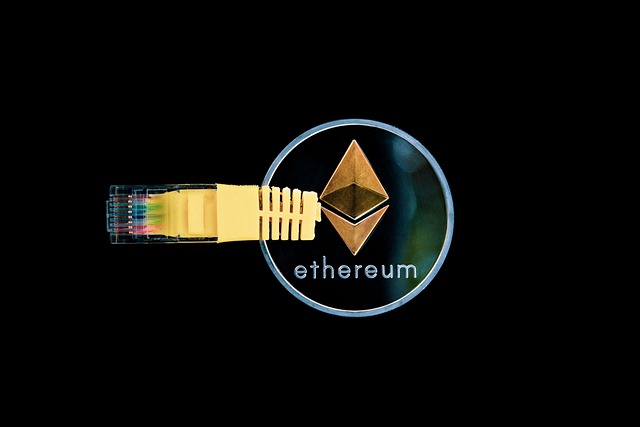Decentralized Finance Stocks: Paving the Way for Financial Freedom
Decentralized Finance Stocks: Paving the Way for Financial Freedom

I. Introduction to a New Era
Welcome to a new era in the world of finance! Over the past decade, we have witnessed a remarkable transformation in the way people manage and invest their money. This paradigm shift can be attributed to the rise of decentralized finance, or DeFi, which has fundamentally changed the traditional financial landscape.
Gone are the days when banking and investing were solely controlled by centralized institutions. With the advent of blockchain technology, individuals and businesses now have the opportunity to bypass intermediaries and engage directly with financial markets through decentralized applications. This opens up a world of possibilities, allowing anyone with an internet connection to access a wide range of financial services and investment opportunities. From borrowing and lending to trading and investing, decentralized finance stocks offer individuals the freedom to take control of their financial future like never before.
Understanding the Basics: What Are Decentralized Finance Stocks?
A new wave of innovation is sweeping the financial world, introducing a concept known as decentralized finance stocks. But what exactly are these stocks and how do they differ from traditional stocks? To put it simply, decentralized finance stocks are a type of investment that operates on the principles of blockchain technology. Unlike traditional stocks that rely on centralized intermediaries, decentralized finance stocks operate on a decentralized network, allowing peer-to-peer transactions to occur without the need for a central authority. This innovative approach aims to disrupt the traditional financial system by removing intermediaries, reducing costs, and increasing transparency and accessibility for individuals worldwide.
One of the key features of decentralized finance stocks is their ability to provide individuals with greater control over their own financial assets. With traditional stocks, individuals typically need to rely on intermediaries, such as brokers or custodians, to handle their investments. This can be both costly and time-consuming, as these intermediaries often charge fees for their services. In contrast, decentralized finance stocks enable individuals to directly control and manage their investments through the use of smart contracts. These self-executing contracts eliminate the need for intermediaries, providing individuals with faster and more cost-effective ways to invest in a diverse range of assets.
Exploring the Benefits of Decentralized Finance Stocks for Individuals
Decentralized finance stocks offer a range of benefits for individuals looking to diversify their investment portfolio. One of the significant advantages is the potential for higher returns. Unlike traditional stocks, which are tied to the performance of a single company, decentralized finance stocks allow individuals to invest in a variety of digital assets and cryptocurrencies. As the popularity of cryptocurrencies continues to grow, there is a strong potential for substantial gains in these decentralized finance stocks.
Another benefit of decentralized finance stocks is the increased access and inclusion they offer. Traditional financial systems often have barriers to entry, such as high transaction fees, limited accessibility for certain demographics, and slow processing times. Decentralized finance stocks, on the other hand, utilize blockchain technology, which allows for faster, cheaper, and more accessible transactions. This opens up opportunities for individuals who have previously been excluded from the traditional financial system to participate in investment activities and potentially improve their financial standing.
How Decentralized Finance Stocks Are Revolutionizing the Traditional Financial System
Decentralized finance stocks are shaking up the traditional financial system in ways never seen before. Instead of relying on a centralized authority like banks or governments, decentralized finance stocks are built on blockchain technology, which allows for a more transparent and trustless system. This means that individuals can participate in financial activities without the need for intermediaries, such as brokers or clearinghouses. By bypassing these middlemen, decentralized finance stocks are effectively cutting out unnecessary costs and barriers, making investing and trading more accessible to a wider range of people.
Moreover, decentralized finance stocks also offer a new level of freedom and control for individuals. With traditional financial systems, transactions often require permission from multiple parties, leading to delays and potential for fraud. However, with decentralized finance stocks, transactions are executed automatically, without the need for intermediaries to approve or verify them. This not only streamlines the process, but it also brings security and efficiency to the forefront. Through the use of smart contracts, which are self-executing agreements recorded on the blockchain, decentralized finance stocks ensure that transactions are executed precisely as programmed, eliminating the possibility of human error or manipulation. This revolutionizes the way financial systems operate, empowering individuals to take charge of their own financial activities with greater confidence and control.
The Role of Blockchain Technology in Decentralized Finance Stocks
Blockchain technology plays a critical role in the emergence and success of decentralized finance stocks. At its core, blockchain is a decentralized ledger that records and verifies transactions across a network of computers. This technology allows for transparent and secure transactions without the need for intermediaries, such as banks or financial institutions. In the context of decentralized finance stocks, blockchain technology ensures that transactions are accurately recorded, immutable, and accessible to anyone with an internet connection. This transparency and accessibility not only increase trust and efficiency but also reduce the costs associated with traditional financial systems.
Moreover, blockchain technology introduces smart contracts, which are self-executing contracts with predefined rules and conditions. These contracts automatically execute transactions when the predetermined criteria are met, eliminating the need for third-party intermediaries. This feature of blockchain technology is particularly beneficial for decentralized finance stocks as it enables automated processes, reduces costs, and enhances operational efficiency. Additionally, smart contracts eliminate the risk of human error or bias, further enhancing the reliability and trustworthiness of decentralized finance stocks.
Exploring the Risks and Challenges of Investing in Decentralized Finance Stocks
As with any investment opportunity, there are risks and challenges associated with investing in decentralized finance stocks. One of the main challenges is the volatility of the market. Decentralized finance stocks can experience significant price fluctuations in a short period of time, which can make it challenging for investors to predict and navigate market movements. This volatility is often driven by factors such as regulatory uncertainty, changes in investor sentiment, and technological developments. Therefore, individuals looking to invest in decentralized finance stocks should be prepared for potential ups and downs in the market and should carefully consider their risk tolerance before investing.
Another challenge when investing in decentralized finance stocks is the lack of regulatory oversight. Unlike traditional financial markets, decentralized finance operates outside of traditional regulatory frameworks, which means that investors may not have the same legal protections and safeguards as they do with traditional investments. This lack of regulation can make it difficult for investors to resolve disputes, recover losses, or hold accountable any fraudulent or malicious actors. Therefore, individuals considering investing in decentralized finance stocks should exercise caution and conduct thorough research on the project or platform they are investing in to mitigate potential risks.
The Potential Impact of Decentralized Finance Stocks on Global Financial Inclusion
Decentralized finance (DeFi) stocks have the potential to greatly enhance global financial inclusion. By leveraging blockchain technology and eliminating the need for intermediaries, DeFi stocks offer individuals in underserved regions the opportunity to access financial services that were previously inaccessible or too costly. This has the potential to close the gap between the unbanked population and the rest of the world, allowing individuals to participate in the global economy.
One of the key advantages of DeFi stocks is their ability to provide financial services without the traditional barriers that often exclude marginalized communities. With DeFi, individuals can bypass the need for a physical bank branch or the requirement of maintaining a minimum balance, enabling them to easily save, borrow, and invest their money. This accessibility can empower those who previously had limited resources to build wealth and secure their financial futures. Moreover, with the ability to transact seamlessly across borders, DeFi stocks can facilitate international trade and remittances, enabling individuals to participate in the global market even if they are located in remote areas.
Navigating the Different Types of Decentralized Finance Stocks Available
When it comes to navigating the different types of decentralized finance stocks available, investors are faced with a myriad of choices. Decentralized finance, or DeFi, has opened up opportunities for individuals to participate in the financial markets in entirely new ways. From decentralized exchanges (DEXs) to lending and borrowing platforms, the range of options for investing in DeFi stocks is vast.
One type of decentralized finance stock that has gained significant popularity is the governance token. These tokens grant holders the ability to participate in the decision-making processes of a decentralized protocol or platform. By owning these tokens, investors can have a say in the future direction of the project and potentially benefit from their involvement. However, it’s essential to conduct thorough research on the projects behind governance tokens and evaluate the level of decentralization and security they offer.
In addition to governance tokens, there are also decentralized lending platforms that provide individuals with the opportunity to lend or borrow digital assets. These platforms operate on smart contracts, eliminating the need for intermediaries, such as banks or traditional lending institutions. As an investor, it’s crucial to carefully assess the risks associated with lending or borrowing on these platforms, such as the volatility of digital assets and the potential for smart contract vulnerabilities.
Ultimately, navigating the different types of decentralized finance stocks requires understanding the intricacies of each investment option. By conducting thorough research, evaluating the risks and benefits, and staying up-to-date with the latest developments in the DeFi space, investors can make informed decisions about the types of decentralized finance stocks that align with their investment goals and risk tolerance.
Key Considerations for Investing in Decentralized Finance Stocks
When considering investing in decentralized finance stocks, there are several key factors to take into account. First and foremost, it is crucial to conduct thorough research and understand the underlying technology behind these stocks. Decentralized finance relies heavily on blockchain technology, which offers transparency, security, and immutability.

Another important consideration is the volatility of decentralized finance stocks. As with any investment, there are risks involved, and the value of these stocks can fluctuate rapidly. It is essential to have a clear understanding of your risk tolerance and to invest only what you can afford to lose. Diversifying your portfolio can also help mitigate some of these risks. Additionally, staying updated on the latest news and trends in the decentralized finance market can provide valuable insights and inform your investment strategy. By carefully considering these factors, individuals can navigate the decentralized finance space more confidently.
The Future Outlook: Predictions and Trends for Decentralized Finance Stocks
The future of decentralized finance stocks looks promising, with experts predicting continued growth and innovation in this space. As more individuals and institutions become aware of the benefits and potential of decentralized finance, we can expect to see increased adoption and investment in these stocks. This will likely lead to a greater diversification of decentralized finance offerings, providing investors with a wider range of options to choose from.
One of the key trends that we can anticipate is the integration of decentralized finance into traditional financial systems. As the benefits of decentralized finance become more evident, traditional financial institutions are likely to explore ways to incorporate these technologies into their existing infrastructure. This integration could potentially lead to a greater acceptance and legitimacy of decentralized finance stocks in the mainstream finance industry. Additionally, we can also expect advancements in blockchain technology, which underlies decentralized finance, to further enhance the efficiency and scalability of these stocks.
What are decentralized finance stocks?
Decentralized finance stocks refer to stocks that are tied to decentralized finance (DeFi) projects or companies operating in the DeFi sector.

How are decentralized finance stocks different from traditional finance stocks?
Decentralized finance stocks operate on blockchain technology and are part of the decentralized finance ecosystem, whereas traditional finance stocks are tied to centralized financial institutions. Decentralized finance stocks aim to disrupt and revolutionize the traditional financial system by providing more transparent, accessible, and inclusive financial services.
What are the benefits of investing in decentralized finance stocks?
Investing in decentralized finance stocks allows individuals to participate in the growth and potential profits of the DeFi sector. These stocks provide exposure to innovative technologies and financial services that have the potential to reshape the financial industry. Additionally, investing in decentralized finance stocks offers the opportunity for diversification and potentially higher returns.
What role does blockchain technology play in decentralized finance stocks?
Blockchain technology is the underlying technology behind decentralized finance stocks. It enables the secure and transparent recording of financial transactions and the execution of smart contracts. Blockchain technology eliminates the need for intermediaries, reduces costs, and provides increased security and transparency in the DeFi ecosystem.
What are the risks and challenges of investing in decentralized finance stocks?
Investing in decentralized finance stocks comes with certain risks and challenges. The DeFi sector is relatively new and still evolving, which means there is a higher level of uncertainty compared to traditional finance stocks. Market volatility, regulatory uncertainties, and potential security vulnerabilities are some of the risks associated with investing in decentralized finance stocks.
How can decentralized finance stocks impact global financial inclusion?
Decentralized finance stocks have the potential to greatly impact global financial inclusion. By leveraging blockchain technology, decentralized finance platforms can provide financial services to individuals who are unbanked or underbanked.

What are the different types of decentralized finance stocks available?
There are various types of decentralized finance stocks available, including stocks tied to DeFi platforms, decentralized exchanges, lending platforms, asset management platforms, and more. These stocks represent ownership in companies or projects that facilitate different aspects of decentralized finance.
What should I consider before investing in decentralized finance stocks?
Before investing in decentralized finance stocks, it is important to research and understand the specific project or company behind the stock. Factors to consider include the team’s expertise, the value proposition of the project, the market potential, the regulatory environment, and the overall risks and rewards associated with the investment.
What are the future predictions and trends for decentralized finance stocks?
The future outlook for decentralized finance stocks is promising. With the increasing adoption of blockchain technology and the growth of the DeFi sector, decentralized finance stocks are expected to continue attracting investors’ attention. As regulations evolve and the industry matures, we can expect to see more institutional involvement and mainstream acceptance of decentralized finance stocks.
Todays Featured Product:
Buy, exchange and grow your crypto securely with a Ledger hardware wallet, combined with the Ledger Live app. It’s never been easier to keep your crypto safe and accessible. Buy direct from Ledger.com and get todays Special Offers Here.




